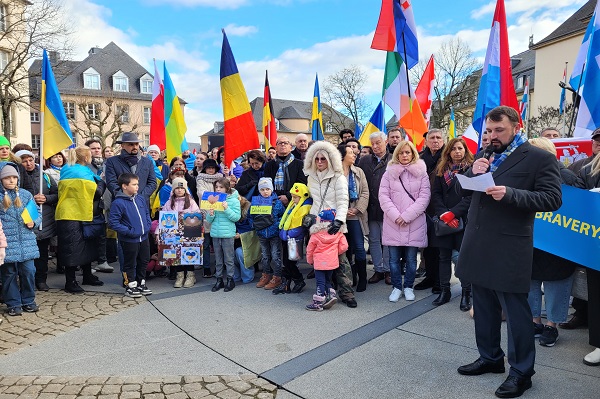 Solidarity march marking one year of resistance against Russia's full-scale invasion of Ukraine, 25 February 2023;
Credit: Jazmin Campbell / Chronicle.lu
Solidarity march marking one year of resistance against Russia's full-scale invasion of Ukraine, 25 February 2023;
Credit: Jazmin Campbell / Chronicle.lu
Chronicle.lu had the opportunity to speak with Nicolas Zharov, President of LUkraine asbl, ahead of the second anniversary of Russia's full-scale invasion of Ukraine, about the importance of remembering the ongoing conflict and what is at stake.
To remind people in Luxembourg of the continuing war, LUkraine asbl is organising a solidarity march in the capital on Saturday 24 February 2024. The rally will depart from Luxembourg Railway Station (Gare de Luxembourg) at 14:15, arriving at Place de Clairefontaine in Luxembourg-Ville at 15:00, where the official speeches are expected to last until 16:30.
Speaking to Chronicle.lu about the significance of this demonstration, Nicolas Zharov noted that "people tend to forget some important things" and this rally aims to "remind [people] that the war is still going on, people are dying everyday". He mentioned the need to fight so-called "Ukraine fatigue" and also to educate people on the current situation in Ukraine and "what should be done in order to avoid the wrong path". Nicolas added that it was about "propos[ing] a plan how to proceed and to similate the situation of what might happen if the global political instability will influence help to Ukraine". He later explained that should the upcoming US elections impact this support, "Europe will have to think how to mobilise more resources [and] its economy, how to pressure Russia without being ashamed of its decisions."
Nicolas stressed that whilst Ukraine remains "thankful" for the support it receives, current aid is "not sufficient". He added that "we should operate on the facts" and beware "the biggest danger", namey that "the Russian war machine is actively developing while we tend to continue living our normal lives."
The main message of the upcoming rally in Luxembourg is: "Ukraine’s fight, Europe's future". Nicolas noted that Ukraine is first and foremost fighting for its land, its rights and its people, as well as for democracy, "but we want also to make people understand that [the conflict] may spread [like] in the Second World War. [...] The world is following the same path and this path is just wrong." He added that Ukraine's war is Europe's war, just as Ukraine's peace is Europe's peace: "The resolution of the situation in Ukraine will influence the European order and future generations. [...] So, we should take responsibility for our actions today because these actions will remain our heritage."
Asked whether support, specifically donations, for Ukraine and Ukrainian refugees in Luxembourg has remained stable over the past two years, Nicolas noted that LUkraine asbl has "faced an incredible drop in donations" and is "trying to change tactics" (more on this in a subsequent interview). He acknowledged that the war in Ukraine is not the only conflict at present and people are trying to help where they can. However, he reiterated that a "war on the European continent of this scale is something we haven't seen for the last 70 years" and the stakes are high. "We try to revert the priorities back to Ukraine [with] this message - that this is priority no.1 for everyone right now," he said.
It is estimated that about 1,000 Ukrainians having sought refuge in Luxembourg since Russia's full-scale invasion have since left, whilst approximately 4,100 remain in the Grand Duchy. Nicolas explained that it is difficult to know whether those who left returned to Ukraine or went elsewhere, as there is no tracking system for returnees. Some have tried to return to Ukraine, but the security situation forced them to come back to Luxembourg.
Challenges persist for those still present in Luxembourg. Nicolas noted that housing is "a national problem", not only for refugees; there are also fewer host families one to two years on and government capacities are "limited". Whilst the temporary protection status has been extended until March 2025, the "temporary" nature of their stay is a challenge in itself for many refugees, as they "cannot plan [...]. Life goes on, they are just waiting and waiting". For its part, LUkraine asbl is trying to "empower people" through its projects, which help refugees become more integrated in life in Luxembourg.
Nicolas emphasised that, in order to address such challenges, Luxembourg and the European Union as a whole must "choose a path and stick with [it], whether it's a question of helping refugees or helping Ukraine - because those two things are related." He added: "Solving one problem will also solve the other."
Despite the challenges, many Ukrainian refugees are making the most of their time in Luxembourg. Nicolas shared that "people are discovering Luxembourg more and more. They are educating themselves, getting the best they can from their time spent in Luxembourg." He stressed that motivation was key, regardless of one's situation: "[LUkraine says] don't get exasperated, just keep on fighting, whether you are on the frontline in Ukraine or you are here trying to protect you and your family." He concluded: "Without motivation, there is no army and there is no future."








